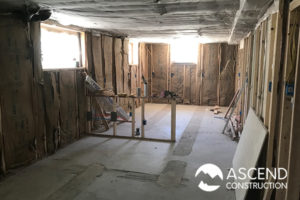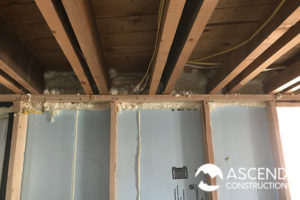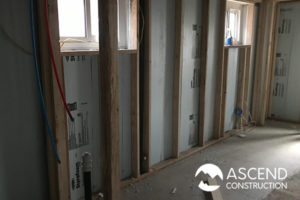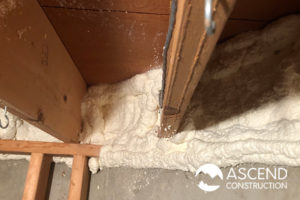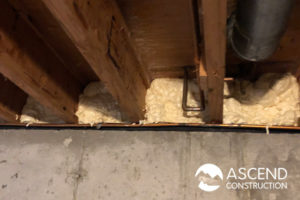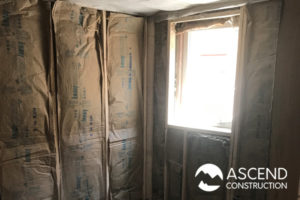- Is your basement currently uninsulated and you would like to create a comfortable living space?
- Is the sound between your basement and first floor becoming unbearable due to footsteps or loud tenants?
Ascend Construction is your one-stop-shop for creating a comfortable & private basement space whether currently finished or undergoing new construction.
Why Consider Improving Your Colorado Basement Insulation?
REQUEST A FREE, NO-OBLIGATION QUOTE!
"*" indicates required fields
Prior Basement Insulation Installation Projects In Colorado
Colorado Basement Insulation FAQs:
Basement Insulation
The key to a comfortable basement year-round is to have your Colorado home's basement insulated properly. There are many ways to accomplish this goal and at Ascend Construction, we can provide guidance and assistance in determining the best insulation solutions in your basement to meet your needs and budget. Read more...
Colorado Basement Insulation
A crucial step that you have to take to turn a basement into a comfortable and livable space is to regulate its temperature. While basements do have natural insulation from the surrounding earth, you'll likely need to add more insulation to comply with the basement insulation code in Colorado as well as fully control temperatures.
Several methods are available for both before and after wall framing. The right insulation technique will keep your basement cool or warm depending on the time of the year. Additionally, your energy bills will likely reduce because your cooling and heating needs will reduce. However, most insulation doesn't prevent air from streaming into your basement through tiny gaps and cracks. To both air seal and insulate your home, you need either basement spray foam insulation.
Also, to prevent moisture and condensation buildup in your insulation, you should include a vapor barrier in your insulation as well as seal air leaks. Also, before you purchase a new cooling or heating system, you should consider adding insulation first. Adequate insulation can allow you to buy a smaller, less costly heating system or may keep enough heat or cold out that you may not need a cooling system altogether.
Basement Wall Insulation In Colorado
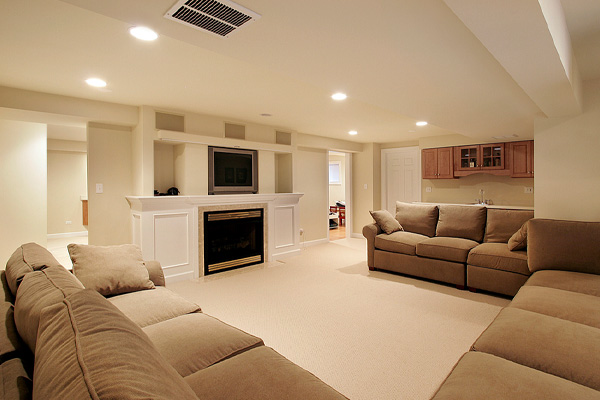
Proper basement wall insulation can ensure that your basement space remains dry and comfortable. In new construction, including insulation in the exterior part of your basement walls will ensure the following:
- Limit heat loss via foundation and minimize thermal bridging
- Protect damp-proof coating from being damaged during backfilling
- Protect against moisture intrusion
- Reduce interior temperature shifts by making the foundation a part of the conditioned space
- Conserve room area
- Prevent condensation on surfaces
In existing homes, adding exterior insulation to basement walls is less practical. Interior basement insulation comes with the following advantages:
- Less costly compared to exterior insulation
- You can opt for almost any type of insulation
- Reduces the risk of insect infestation
Some of the things you should consider when exploring the various interior basement insulation options include:
- With many of the insulation types, you'll need to include fire-rated cover because they discharge toxic gases when they catch fire
- Interior insulation reduces the usable space in your basement by a couple of inches.
- Unlike exterior insulation, it doesn't shield the damp-proof coating.
- The insulation can be saturated by moisture seeping through the foundation wall if your perimeter drainage is inadequate.
- Good quality vapor diffusion retarders and air-sealing details are necessary for adequate performance.
The insulation options include:
- Batt and roll (Blanket) insulation
- Insulation concrete blocks
- Loose-fill insulation
- Foam board insulation
- Sprayed foam insulation
- Insulating concrete forms
Basements are notorious for issues with water intrusion, mold, and humidity. So moisture control should be a key part of the insulation.
Colorado Basement Ceiling Insulation
There are numerous basement ceiling insulation options with the main ones being blanket insulation and spray foam insulation. To choose the ideal insulation material you should consider the kind of conditions you want to remedy as well as your unique situation.
Basement Ceiling Insulation Pros and Cons
Basement Ceiling Insulation Pros
1. Better Temperature Management
Without adequate insulation in your basement, the damp and cold air emanating from your basement will work against your heating in winter, the humid and hot air will reduce the effectiveness of cooling in the summer. Moreover, if you have heating installed in your basement, ceiling insulation ensures that you don't lose heat to the space above your basement.
2. Improved Sound Proofing
Ceiling insulation can create an effective sound barrier between your basement and the floor above. The insulation can ensure that the noise generated in your basement doesn't disturb the people in the spaces above or vice versa. This is useful if your basement functions as an office or say a rehearsal space.
3. Improved Comfort
With adequate ceiling insulation, it's easier to maintain an even temperature in your basement.
4. Adhere to Local Building Requirement
Building codes often require property owners to meet a given R-value in the basement. Numbers vary from region to region but ceiling insulation can help you attain the set target.
5. Keep Out Allergens
Mildew, dust, mold, and other allergens can form in your basement and spread into the above living spaces. You can keep out the allergens through adequate insulation.
Basement Ceiling Insulation Cons
Loss of Space - You could lose some height once you add insulation material to the ceiling.
Is insulating Basement Ceiling Worth it?
Insulating the basement ceiling comes with numerous advantages. You should have your contractor review your house's overall energy efficiency when deciding on the insulation options that will provide you with the most value.
Insulation Costs For Basements In Colorado
Insulating basement walls cost and labor cost to install insulation vary depending on the type of insulation you choose. For a precise figure, get an estimate from Ascend Construction.
Basement Installation FAQs
What kind of insulation should be used for basement walls?
Various insulation types come with various pros and cons. Contact us to discuss the different options available for your circumstances.
What is the best insulation for basement walls?
To decide on the ideal insulation, you should first figure out the current insulation levels (R-value of your insulation) and then see how they compare with the recommended levels. Then you can opt for a type of insulation that adequately insulates your home and basement as well as suits your circumstances.
What R-value does insulation for basement walls and ceilings provide?
Different insulation types offer different R-values. It is best to discuss your options with an insulation contractor to see what options best meet your needs.
What To Expect With Basement Insulation Project From Ascend Construction
When working with Ascend Construction on your basement insulation project, your home will be in the best hands from design through implementation with our highly trained team of designers and technicians.
Insulating a basement space typically requires providing thermal insulation along foundation walls, as well as insulation for sound absorbance between floors.
Ascend Construction offers a variety of options for these scenarios, depending on the needs of our customers.
Rim and Joist Air Sealing
When given the opportunity to work in unfinished basement spaces, we recommend starting with a Rim and Joist air sealing measure. This measure reduces air leakage, improving comfort as well as energy efficiency.
Additionally, this measure reduces the risk of freezing water lines. A rim and joist is a location where wooden framing members meet concrete foundation, creating an irregular seal leading to high levels of air leakage. Your rim and joist is then fully spray foamed eliminating air leakage points.
Basement Walls and Ceiling Insulation
Next, we want to insulate the walls and ceiling of your unfinished space. In this scenario, we can treat the ceiling of the basement with the same measures as the walls.
We can offer options such as:
- Rigid foam board
- Net and blow dense packing
- Spray foam insulation
- Foam flashing
- Batt insulation
To learn more about each of these options click here.
If your basement space is already finished but is lacking insulation, there are a variety of options for this scenario as well.
Whether the issue is sound transfer through floors or a lack of insulation in wall cavities, both issues can be resolved through a closed cavity insulation dense pack.
To do this, Ascend Construction will begin by drilling access holes into framing cavities around your basement exterior walls or ceiling. This allows access to the open and uninsulated walls.
We then utilize our specialty dense-pack insulation equipment to fill the wall or ceiling cavities with densely packed insulation. Upon completion of our work, all of the holes will be patched to their original form, leaving our only trace to be daily reminders of your newfound home comfort and privacy
We service the following towns and cities:
Click here for a complete listing of all the towns and cities we service in Colorado and Wyoming.

